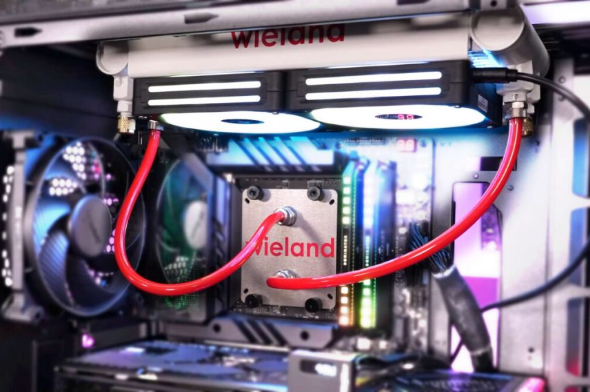Connection to DriversCloud Create a DriversCloud.com account Reset your DriversCloud.com password Account migration
When PC watercooling goes without a pump... and even without "water"!
Increasingly used, especially on the most heat-intensive systems, watercooling may soon have some competition.
It's a fact that powerful fans can still suffice, even on very demanding processors. Today, however, it is sometimes simpler and more reassuring to employ a watercooling solution, especially as all-in-one kits - also known as AiO - have made the installation and maintenance of watercooling products much simpler. What's more, while Intel's and, to a lesser extent, AMD's beefier processors give off more and more heat, a big AiO is sometimes the best solution for keeping a PC relatively discreet. "Relatively", because despite all our efforts, pumps can be a problem, especially when they start to run out of steam... no pun intended.
Pushed to its limits, the pump in a watercooling kit can quickly turn up the heat and generate a noise that is not only quite audible, but also rather unpleasant, as it is louder than the hum of 12 or 14 centimetre diameter fans. As VideoCardz explains, Wieland may well have found a solution to this problem. It's a solution summed up in one word - thermosyphon - and a prototype of it was presented to the renowned German overclocker and tester, Der8auer. The prototype in question doesn't yet have a name, but Der8auer was quick to receive, try out and compare the beast with an AiO watercooling kit of the same dimensions, the Corsair H150i. To make the comparison between the two solutions as fair as possible, Der8auer replaced the fans used by Wieland with Noctua fans, which are quite similar to those used by Corsair on the H150i.
Thermosyphoning is a technology that dispenses with pumps altogether, swapping the coolant used in AiOs for a gas. This gas stream no longer needs to be propelled by the pump, as it is displaced by heat, employing an operating system similar to that of certain boilers or heat pumps. Since the pump disappears, noise pollution from such a system is limited to that of radiator fans. And since the coolant no longer exists, there's no risk of a disastrous leak for the system. Is Wieland's thermosyphon all good?
For the time being, no. In fact, by testing the Wieland prototype and the Corsair H150i, Der8auer was able to observe that efficiency was still in the camp of the AiO watercooling kit. Thus, with an AMD Ryzen 9 7950X processor on the Cinebench R23 stress test, Wieland's product reached 78°C, i.e. 8°C higher than on the Corsair H150i. A notable difference. That said, as proof that Wieland's solution has a future, on the video games used by Der8auer, the heating was quite similar. Moreover, it should not be forgotten that this is still only a prototype sent by Wieland, and several areas for improvement have been identified by the tester: reducing air leaks at the radiator and replacing the aluminum cold plate with a copper solution, for example. The thermosyphon seems to have some serious trump cards up its sleeve. A technology to keep a close eye on.







